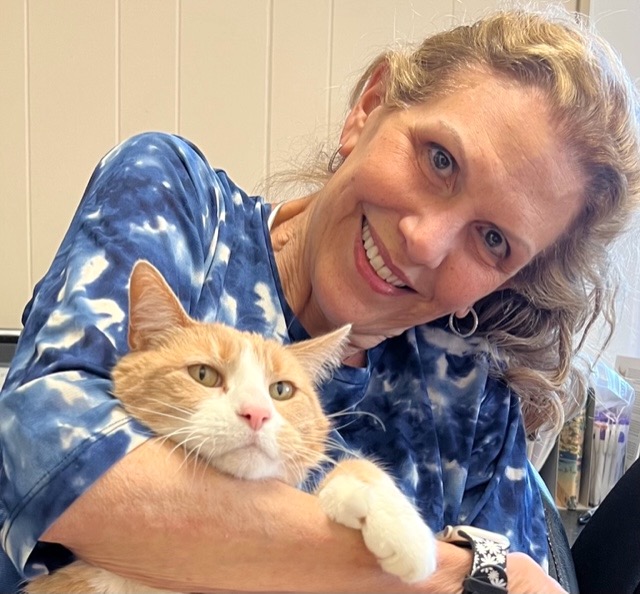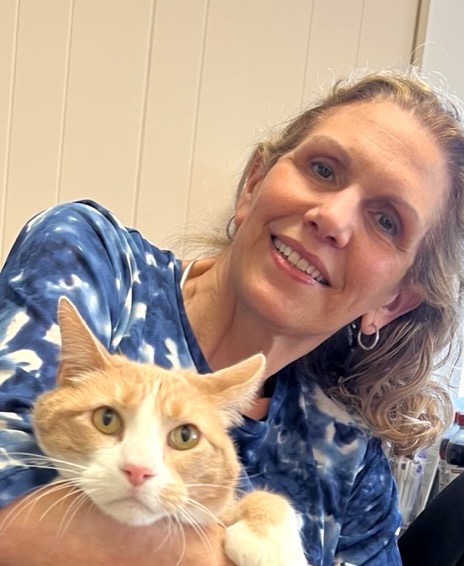Did you know that almost half of all companion cats never receive health care? [1] Our Cat Person of the Month, Dr. Jane Brunt, believes that every cat deserves veterinary care, and so she and a team of fellow cat enthusiasts created CATalyst Council.
CATalyst Council is a non-profit organization that connects veterinarians and other groups—animal shelters, foundations, private companies, and media concerned with kitty welfare—to accelerate innovation in feline care to enhance the quality of life for cats and their people. Among their many achievements, CATalyst Council established a grant program to increase healthcare and access to care for companion cats. Their first grantee was the animal welfare organization Better Together Animal Alliance. CATalyst Council awarded the Idaho-based organization a $20,000 grant to improve data collection of its helpline services, to evaluate if telehealth can help prevent the return of cats to the shelter, and to serve as a model for other helpline services and animal shelters.
In addition to being a founding member and Executive Director of CATalyst Council, Dr. Brunt opened the first feline-exclusive veterinary practice in the State of Maryland. She’s also a national advisor on feline medicine, a founding Fellow of the Academy of Feline Medicine, and past president of the American Association of Feline Practitioners and the Maryland Veterinary Medical Association.
Mewla: Welcome, Dr. Brunt! We’re so happy to have you here and to learn about CATalyst Council’s advocacy for our feline friends.
Dr. Brunt: Thank you for choosing me as your Cat Person of the Month! It’s so important for all cat champions to collaborate, and I’m honored to be among those who have already been featured.
Mewla: We are excited to hear more about your work! Will you tell us how the CATalyst Council helps educate people about cat care?
Dr. Brunt: At CATalyst Council, care is embracing community-wide relationships to further the well-being of companion cats. As with our grant, we work with other organizations by developing data and providing tools that are helpful to them and the people in their networks. This way Business to Business to Consumer model helps us make a far greater impact on making positive changes for lifelong cat wellness and healthcare.
Mewla: You started the first exclusively cat veterinary practice in the State of Maryland. We love the idea of an all-cat veterinary clinic. What would you say is the biggest benefit of bringing companion cats to a cat-only clinic vs. another veterinary clinic?
Dr. Brunt: The benefits of a cat-only clinic are many! The obvious is there are no barking dogs (and it’s quiet compared to most mixed practices)!
Other benefits become obvious too, when everyone at the clinic understands normal cat behavior. For example, clinic staff knows that any change in a cat’s routine or surroundings causes anxiety. Frequently that anxiety leads to arousal and fear, which can escalate even further,
.
Mewla: That’s fantastic. I love the idea of a cat-friendly practice. What does it mean when a veterinary clinic is Cat-Friendly Certified?
Dr. Brunt: Cat-Friendly Certified veterinary practices (cat-only and mixed practices) are endorsed by the American Association of Feline Practitioners as having the science-based resources and tools to know how to mitigate anxiety, and most especially how to handle cats. Like CATalyst Council, AAFP believes in evidence-based medicine, and they offer many open-access online resources. An example of what is done at Cat Hospital At Towson in understanding normal behavior is that instead of using the word “restrain” we say “handle.” The words have different meanings, evoke different mindsets, and lead to a more positive outcome.

Mewla: Many cats have benefitted from cat-friendly practices. Also, as a consumer, I value knowing which practitioners offer evidence-based medicine and procedures, given all of the products and services out there.
Currently, many types of pet insurance are offered. What should cat companions/caregivers think about when choosing pet health insurance, especially those who might not have a lot of money?
Dr. Brunt: There are many options for controlling the costs of feline health care with pet health insurance, so compare the features and deductibles that are available and meet your pets’ needs and your pocketbook. Some policies are available through the cat parent’s workplace and can be paid through their payroll. The best time to get pet health insurance is before you need it, so as a healthy kitten, or whenever you first get your cat.
In any case, it’s crucial that people change their flawed ideas about what “my cat never goes outside” needs. While it’s true that attacks by other animals and trauma are lessened, injuries still occur. And indoors-only cats still get parasites and medical conditions that require treatment. The BEST way to manage health care is an exam at least every 6-12 months with their veterinarian (Cat-Friendly Certified if available), hopefully just for wellness. Identifying and addressing health concerns before they become obvious is usually the best way to minimize costs.
Mewla: We appreciate your expert advice, Dr. Brunt.
Some of our readers may be interested in careers as a veterinarian, which I imagine means that they’d need to take a lot of chemistry, biology, and physics courses in high school and college. How else might someone interested in a career as a veterinarian prepare for veterinary school?
Dr. Brunt: At CATalyst Council we are all about celebrating the human-feline bond, and a career in veterinary medicine is a very meaningful way to do that.
I love interacting with young people who are thinking about a career in Veterinary Medicine. There are so many opportunities in clinical practice and beyond, including public service, academia, and animal welfare. Coursework and experience in STEAM (Science, Technology, Engineering, the Arts, and Math) areas are required, and today being well-rounded is important when applying to Veterinary Colleges. A concept I like to share with people interested in Veterinary Medicine relates to CATalyst Council’s mission to “enhance quality of life for (animals) and their people.” While young people might think that veterinary medicine is all about the animals, it’s important to recognize the impact of the Human-Animal Bond and be willing to make people part of their “why.” I like to say, “Come for the animals, stay for the people.”
Mewla: LOL. My bond with my cat companions is so strong that, when one is sick, I can be a bit of a basket case. It means a lot when our veterinarian understands how much our cats mean to us. One question I love to ask: When did you first come to love cats/animals?
Dr. Brunt: I love my memory of visiting my grandparents’ farm and seeing all the cats run towards the house every afternoon and jump on top of the covered well when they heard my grandmother use the electric can-opener. Come to think about that while writing this, I only remember seeing her using the can opener for cat food.
Mewla: What a great memory! And who are the cats/animals in your home today?
Dr. Brunt: I have two cat companions. Stanly is a big cream tabby who was hand-chosen for me by Bob Rohde, the former CEO of Dumb Friends League in Denver, and a secret mentor of mine in Animal Welfare. Freddy is a long black cat that I adopted from CROM- Cat Rescue of Maryland. Both organizations continue to do great work in their communities, and beyond.
Mewla: Stanly looks beautiful and Freddy sounds like a sweetie too! Thank you so much for joining us and for all you do to help cats.
If readers would like to learn more about CATalyst Council’s or Dr. Brunt’s Baltimore MD-area exclusively-cat health care clinic, go to:
CATalyst Council, https://catalystcouncil.org/
Cat Hospital At Towson, https://catdoc.com/
References:
- 2017-2018 US Pet Owner and Demographics Sourcebook, American Veterinary Medical Assn. https://www.avma.org/sites/default/files/resources/AVMA-Pet-Demographics-Executive-Summary.pdf
Please leave your comments or questions
about the Dr. Jane Brunt article below.
Have a suggestion? Send us a message via our Contact Us page.





Wow what a great job you are doing everything you are doing for the companion cats is amazing and so rewarding we think you deserve to be pet person of the month 100%DR.Brunt i wish you continued sucess in all you do ! God Bless hugs the cats and me x o
Great article about Dr. Brunt and her advocacy for cats! The idea of veterinary telehealth is intriguing. Telehealth has worked well for me as a human patient in many instances. Enjoyed learning about her cats, too!
Thank you Mewla for this nice article! Dr. Brunt, thank your for your important cat advocacy.
Thank you for this article about Cat Person of the Month! I am all for cat only clinics and wish we had one in my town.
Definitely the most progressive way to move forward with medical care for cats! Dr Brunt is exemplary as a veterinarian and a feline wellbeing activist….blazing trails and inspiring others. Thank you shining the spotlight on her.
Congratulations Dr. Brunt! Thank you Mewla for another great article!